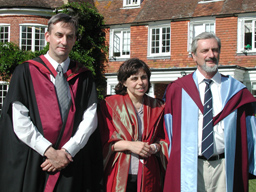Iterative Schemes for the Solution of Systems of Equations arising from the Dual Reciprocity Boundary Integral Method in Multi Domains

Margarita gave a comprehensive presentation on her thesis which was well received by both examiners. In her work the Dual Reciprocity Method (DRM) was implemented in multi-domains (MD), discretizing the domain into smaller sub-domains. This technique, the DRM-MD, proved to be more effective than the DRM applied to the single domain and gave rise to systems of equations which were banded and sparse.
The greater part of her work investigated the sensitivity of different iterative techniques to changes in the discretization of the domain. The study was motivated by the observation that a large condition number occurred in some practical calculations when subsequent divisions of the studied domain took place. Intrinsic properties of the resulting matrices were studied and linked to the performance of the iterative techniques. A code was then developed using quadratic boundary elements to study the behaviour of the DRM-MD, contrasting the results with those obtained for linear boundary elements.
A non-transient convection-diffused boundary valued problem was presented, with variable velocity field. Several numerical examples comprising a set of domain partitions were investigated along with two different radial basis functions. Every example was solved by a series of iterative techniques and the accuracy and efficiency of the iterative method was studied. Efficiency was reported in terms of CPU time and the number of iterations, along with the rate of convergence of the chosen iterative schemes.
The numerical results were in very good agreement with the analytical of the tested problem, finding that the increment of internal points per sub-domain resulted in the regularization of the distribution of the singular values of matrices which arose from the DRM-MD, and consequently improved the accuracy of the solutions.
Margarita is one of the many PhD students to graduate from Wessex Institute since the programme was launched. All the past PhD WIT candidates are now in positions of responsibility in academia and industry throughout the world.

 Wessex Institute
Wessex Institute